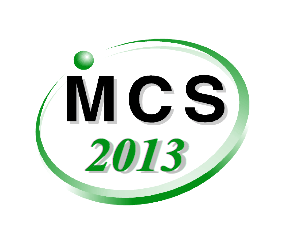|
Technical
program
Program
Schedule
| May 15 |
|
| 07:30 |
Bus pickup |
| 08:30 - 08:40 |
Opening |
| 08:40 - 09:40 |
Invited Talk: Prof. Bin Yu |
| 09:40 - 09:55 |
Coffee break |
| 09:55 - 12:00 |
Session 1: Diversity and
Selective Ensemble |
| 12:00 - 12:30 |
Lunch |
| 12:30 - 18:30 |
Excursion |
| 18:30 - 21:00 |
Banquet |
| |
|
| May 16 |
|
| 07:30 |
Bus pickup |
| 08:30 - 09:30 |
Invited Talk: Prof.
Marcello Pelillo |
| 09:30 - 09:45 |
Coffee break |
| 09:45 - 11:50 |
Session 2: Class-Imbalance
Learning |
| 11:50 - 12:50 |
Lunch |
| 12:50 - 14:55 |
Session 3: Feature Processing |
| 14:55 - 15:10 |
Coffee break |
| 15:10 - 17:40 |
Session 4: Classifier Ensemble |
| 17:40 |
Dinner |
| |
|
| May 17 |
|
| 07:30 |
Bus pickup |
| 08:30 - 09:30 |
Invited Talk: Prof. Xin Yao |
| 09:30 - 09:45 |
Coffee break |
| 09:45 - 11:50 |
Session 5: Multi-Instance and
Part-Based Learning |
| 11:50 - 12:50 |
Lunch |
| 12:50 - 14:05 |
Session 6: Clustering Ensemble |
| 14:05 - 14:15 |
Coffee break |
| 14:15 - 16:20 |
Session 7: Applications |
| 16:20 - 16:25 |
Closing |
| 16:25 |
Lab visit, campus tour and
leave |
Sessions Articles
Session 1: Diversity and
Selective Ensemble
• Diversity in Classifier Ensembles: Fertile Concept or Dead End?
Luca Didaci, Giorgio Fumera, and Fabio Roli
• Can Diversity amongst Learners Improve Online Object Tracking?
Georg Nebehay, Walter Chibamu, Peter R. Lewis, Arjun Chandra,?
Roman Pflugfelder, and Xin Yao
• Selective Ensemble of Classifier Chains
Nan Li, and Zhi-Hua Zhou
• ECOC Matrix Pruning Using Accuracy Information
Cemre Zor, Terry Windeatt, and Josef Kittler
• Selective Clustering Ensemble Based on Covariance
Xuyao Lu, Yan Yang, and Hongjun Wang
Session 2: Class-Imbalance Learning
• Random Oracle Ensembles for Imbalanced Data
Juan J. Rodríguez, José-Francisco Díez-Pastor, and César
García-Osorio
• Ensembles of Optimum-Path Forest Classifiers Using Input Data
Manipulation and Undersampling
Moacir P. Ponti Jr., and Isadora Rossi
• Similarity Weighted Ensembles for Relocating Models of Rare Events
Claire D'Este, and Ashfaqur Rahman
• Adaptive Ensemble Selection for Face Re-identification under Class
Imbalance
Paulo Radtke, Eric Granger, Robert Sabourin, and Dmitry Gorodnichy
• Cascaded Reduction and Growing of Result Sets for Combining Object
Detectors
Uwe Knauer and Udo Seiffert
Session 3: Feature Processing
• Dimensionality Reduction Using Stacked Kernel Discriminant Analysis
for Multi-label Classification
Muhammad Atif Tahir, Ahmed Bouridane, and Josef Kittler
• Stable L2-Regularized Ensemble Feature Weighting
Yun Li, Shasha Huang, Songcan Chen, and Jennie Si
• Ensemble of Feature Chains for Anomaly Detection
Lena Tenenboim-Chekina, Lior Rokach, and Bracha Shapira
• A New Feature Fusion Approach Based on LBP and Sparse Representation
and Its Application to Face Recognition
He-Feng Yin and Xiao-Jun Wu
• Feature Level Multiple Model Fusion Using Multilinear Subspace
Analysis with Incomplete Training Set and Its Application to Face Image
Analysis
Zhen-Hua Feng, Josef Kittler, William Christmas, and Xiao-Jun Wu
Session 4: Classifier Ensemble
• Towards a Framework for Designing Full Model Selection and
Optimization Systems
Quan Sun, Bernhard Pfahringer, and Michael Mayo
• Coding Theory Tools for Improving Recognition Performance in ECOC
Systems
Claudio Marrocco, Paolo Simeone, and Francesco Tortorella
• A Directed Inference Approach towards Multi-class Multi-model Fusion
Tianbao Yang, Lei Wu, and Piero P. Bonissone
• Randomized Bayesian Network Classifiers
Qing Wang and Ping Li
• Self-Organizing Neural Grove and Its Application to Incremental
Learning
Hirotaka Inoue
• A Novel Pattern Rejection Criterion Based on Multiple Classifiers
Wei-Na Wang, Xu-Yao Zhang, and Ching Y. Suen
Session 5: Multi-Instance and Part-Based Learning
• The Link between Multiple-Instance Learning and Learning from Only
Positive and Unlabelled Examples
Yan Li, David M.J. Tax, Robert P.W. Duin, and Marco Loog
• Combining Instance Information to Classify Bags
Veronika Cheplygina, David M.J. Tax, and Marco Loog
• Transfer Learning with Part-Based Ensembles
Shiliang Sun, Zhijie Xu, and Mo Yang
• Improving Simple Collaborative Filtering Models Using Ensemble
Methods
Ariel Bar, Lior Rokach, Guy Shani, Bracha Shapira, and Alon
Schclar
• Single Classifier Based Multiple Classifications
Albert Hung-Ren Ko and Robert Sabourin
Session 6: Clustering Ensemble
• Soft-Voting Clustering Ensemble
Haishen Wang, Yan Yang, Hongjun Wang, and Dahai Chen
• Semi-Supervised Clustering Ensemble for Web Video Categirization
Amjad Mahmood, Tianrui Li, Yan Yang, Hongjun Wang, and? Mehtab
Afzal
• A New Perspective of Support Vector Clustering with Boundary Patterns
Yuan Ping, Huina Li, Yong Zhang, and Zhili Zhang
Session 7: Applications
• Multi-View Multi-Class Classification for Identification of
Pathogenic Bacterial Strains
Evgeni Tsivtsivadze, Tom Heskes, and Armand Paauw
• MRF-Based Multiple Classifier System for Hyperspectral Remote Sensing
Image Classification
Junshi Xia, Peijun Du, and Xiyan He
• Kalman Filter Based Classifier Fusion for Affective State Recognition
Michael Glodek, Stephan Reuter, Martin Schels, Klaus Dietmayer,
and Friedhelm Schwenker
• Gender Classification Using Mixture of Experts from Low Resolution
Facial Images
Yomna Safaa El-Din, Mohamed N. Moustafa, and Hani Mahdi
• Binary Decision Trees for Melanoma Diagnosis
Yu Zhou, and Zhuoyi Song
|

 Contacts
Contacts
 Previous MCS editions
Previous MCS editions  Proceedings
Proceedings



 Contacts
Contacts
 Previous MCS editions
Previous MCS editions  Proceedings
Proceedings



